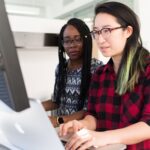Medical schools have responded to the increasing diversity of the population of the USA by incorporating cultural competency training into their curricula. This paper presents results from pre- and post-programme surveys of medical students who participated in a training programme that included evening clinical sessions for refugee patients and related educational workshops. A self-assessment survey was administered at the beginning and end of the academic year to measure the cultural awareness of participating medical students. Over the 3 years of the programme, over 133 students participated and 95 (73%) completed pre- and post-programme surveys. Participants rated themselves significantly higher in all 3 domains of the cultural awareness survey after completion of the programme. An important issue to consider is the power differential between those working in medicine and patients who are refugees. To avoid reinforcing stereotypes, medical programmes and medical school curricula can incorporate efforts to promote reflection on provider attitudes, beliefs and biases.
The home environment and Asian immigrant children’s early literacy skills
Objective.The current study examines how aspects of the home literacy environment were related to Asian immigrant children’s early literacy skills.Design.One hundred and thirty-nine Asian immigrant

